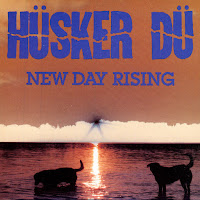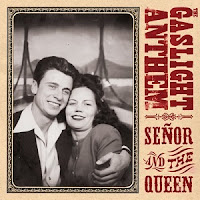Husker Du -- New Day Rising
If the release of Zen Arcade in 1984 established Husker Du as America's most ambitious indie rock outfit, New Day Rising (1985) ensured that the Minneapolis trio would be remembered as one of the most influential as well.
Falling more or less smack-dab in the middle of Husker Du's progression from hardcore punkers to melodic college alt-rockers, New Day Rising preserves the speed and energy prevalent on albums like Land Speed Record and Metal Circus while showcasing the band's increasingly keen pop sensibility.
Although the songwriting rivalry that had formed between Bob Mould and Grant Hart was beginning to take an emotional toll on the band, the pair managed to harness their aggressions and channel it into a concentrated effort to out-write each other. The result, fortunately, was a slew of genre-defining tracks.
Highlights:
Track 1. "New Day Rising." With Hart's steady pounding of the drums as its backbone, the album's title track features Mould's trademark fuzz pedal guitar work and the band's uncanny ability to transform seemingly mundane language (in this case, the song's three-word title) into a gut-wrenching expression of anguish and desperation. Initially reminiscent of a religious mantra, Mould's repetition of "new day rising" accumulates a frantic immediacy as the song progresses. As Hart and Greg Norton add their own oohs, aahs, and new day risings to the mix, Mould seemingly looses what little sense of composure he had at the song's opening and his vocals degenerate into primal shouts as powerful as any Kurt Cobain would muster a decade later. As crescendo piles upon crescendo, "New Day Rising" introduces listeners to the sort of raw-nerve emotion Husker Du alternately contains and unleashes over the course of the album.
Track 2. "The Girl Who Lives on Heaven Hill." The perfect bridge between the intensity of "New Day Rising" and the decidedly poppy "I Apologize."
Track 4. "Folk Lore." Treading the fine line between restraint and catharsis, "Folk Lore" could very well be a microcosm of the entire album.
Track 6. "Celebrated Summer." Frantic and mournful, "Celebrated Summer" remains one of the band's most popular songs.
Track 11. "Books About UFOs." A beautiful example of Grant Hart's songwriting, this track foregrounds melody and showcases the sort of upbeat, quirky lyrics that define his style and provide the optimistic yin to Mould's acerbic yang.
Sobriquet Grade: 95 (A).
Falling more or less smack-dab in the middle of Husker Du's progression from hardcore punkers to melodic college alt-rockers, New Day Rising preserves the speed and energy prevalent on albums like Land Speed Record and Metal Circus while showcasing the band's increasingly keen pop sensibility.
Although the songwriting rivalry that had formed between Bob Mould and Grant Hart was beginning to take an emotional toll on the band, the pair managed to harness their aggressions and channel it into a concentrated effort to out-write each other. The result, fortunately, was a slew of genre-defining tracks.
Highlights:
Track 1. "New Day Rising." With Hart's steady pounding of the drums as its backbone, the album's title track features Mould's trademark fuzz pedal guitar work and the band's uncanny ability to transform seemingly mundane language (in this case, the song's three-word title) into a gut-wrenching expression of anguish and desperation. Initially reminiscent of a religious mantra, Mould's repetition of "new day rising" accumulates a frantic immediacy as the song progresses. As Hart and Greg Norton add their own oohs, aahs, and new day risings to the mix, Mould seemingly looses what little sense of composure he had at the song's opening and his vocals degenerate into primal shouts as powerful as any Kurt Cobain would muster a decade later. As crescendo piles upon crescendo, "New Day Rising" introduces listeners to the sort of raw-nerve emotion Husker Du alternately contains and unleashes over the course of the album.
Track 2. "The Girl Who Lives on Heaven Hill." The perfect bridge between the intensity of "New Day Rising" and the decidedly poppy "I Apologize."
Track 4. "Folk Lore." Treading the fine line between restraint and catharsis, "Folk Lore" could very well be a microcosm of the entire album.
Track 6. "Celebrated Summer." Frantic and mournful, "Celebrated Summer" remains one of the band's most popular songs.
Track 11. "Books About UFOs." A beautiful example of Grant Hart's songwriting, this track foregrounds melody and showcases the sort of upbeat, quirky lyrics that define his style and provide the optimistic yin to Mould's acerbic yang.
Sobriquet Grade: 95 (A).




Comments